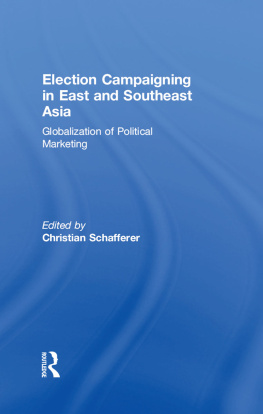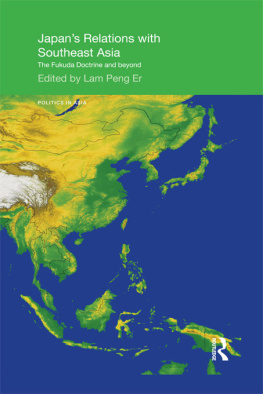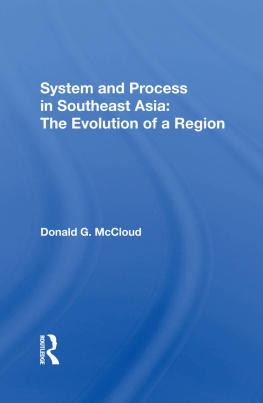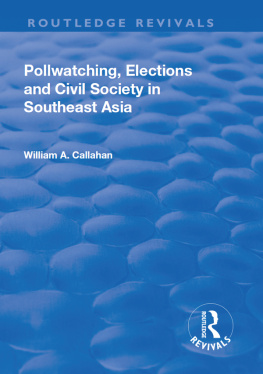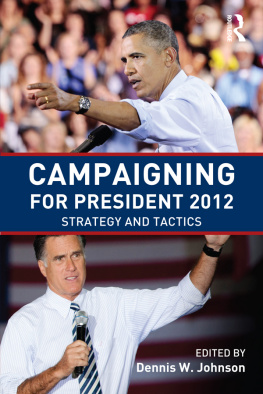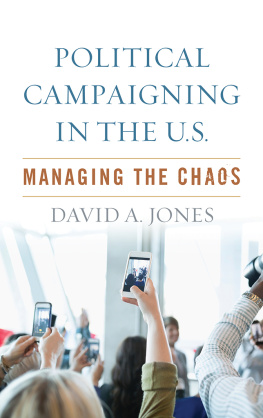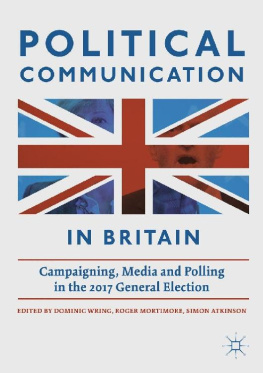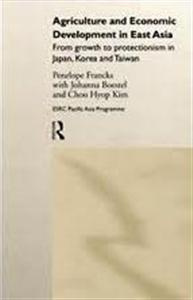ELECTION CAMPAIGNING IN EAST AND SOUTHEAST ASIA
Election Campaigning in East and Southeast Asia
Globalization of Political Marketing
Edited by
CHRISTIAN SCHAFFERER
The Overseas Chinese Institute of Technology, Taiwan
First published 2006 by Ashgate Publishing
Published 2016 by Routledge
2 Park Square, Milton Park, Abingdon, Oxon OX14 4RN
711 Third Avenue, New York, NY 10017, USA
Routledge is an imprint of the Taylor & Francis Group, an informa business
Copyright 2006 Christian Schafferer
Christian Schafferer has asserted his moral right under the Copyright, Designs and Patents Act, 1988, to be identified as the editor of this work.
All rights reserved. No part of this book may be reprinted or reproduced or utilised in any form or by any electronic, mechanical, or other means, now known or hereafter invented, including photocopying and recording, or in any information storage or retrieval system, without permission in writing from the publishers.
Notice:
Product or corporate names may be trademarks or registered trademarks, and are used only for identification and explanation without intent to infringe.
British Library Cataloguing in Publication Data
Election campaigning in East and Southeast Asia : globalization of political marketing
1.Political campaigns - Asia 2.Elections - Asia 3.Globalization
I.Schafferer, Christian, 1972-
324.95
Library of Congress Cataloging-in-Publication Data
Election campaigning in East and Southeast Asia : globalization of political marketing / edited by Christian Schafferer.
p. cm.
Includes bibliographical references and index.
ISBN 0-7546-4393-X
1. Political campaigns--East Asia. 2. Political campaigns--Southeast Asia. 3. Elections--East Asia. 4. Elections--Southeast Asia. 5. East Asia--Politics and government. 6. Southeast Asia--Politics and government--1945- I. Schafferer, Christian, 1972-
JQ1499.A95E54 2005
324.7095--dc22
2005029118
ISBN 9780754643937 (hbk)
Contents
Christian Schafferer
Christian Schafferer with Kawakami Kazuhisa
Christian Schafferer
Lim Hong Hai and Ong Kian Ming
Julio Teehankee
Christian Schafferer
Kawakami Kazuhisa is Professor of Political Psychology and Communication at Meijigakuin University. He holds a Ph.D. in Social Psychology from the University of Tokyo. His field of specialization is the changing voting behavior of the Japanese electorate. His works have been published in academic journals and edited books.
Lim Hong Hai is Associate Professor at the School of Social Sciences, Universiti Sains Malaysia. He received his M.A. in Political Science from the University of Michigan and his Ph.D. from the Universiti Malaya. He has published several important studies on the Malaysian electoral system. His current research addresses public administration and Malaysian politics from a comparative perspective.
Ong Kian Ming is a senior policy analyst at Sedar Institute, an independent nonprofit think tank. He graduated from the London School of Economics with a B.Sc. in Economics. He also holds a Masters degree in Economics from the University of Cambridge. He came back to Malaysia in 1999 and served as a consultant at the Boston Consulting Group. He later joined the Institute of Strategic Analysis and Policy Research, a non-profit think tank promoting nation building and social unity. He has published extensively on Malaysian politics.
Christian Schafferer is Assistant Professor of International Trade at the Overseas Chinese Institute of Technology. His research interests include East Asian politics and the globalization of political marketing. He has authored numerous articles and books. His latest books and edited volumes include The Power of the Ballot Box: Political Development and Election Campaigning in Taiwan (Lexington, 2003), and Understanding Modern East Asian Politics (Nova Science, 2005).
Julio Teehankee is Associate Professor of Political Science at De La Salle University-Manila (DLSU-M), where he has twice served as the Chair of the Political Science Department. He has a Ph.D. in Development Studies from DLSUM, an M.A. in Political Science from the University of the Philippines and an A.B. in Political Science from DLSU-M. His field of specialization is comparative political development with an emphasis on political reforms, conflict resolution, political parties and elections.
About fifteen years ago, Huntingtons breathtaking study on a new wave of democratization that first affected Portugal in 1974 and swept all over the world caught the attention of scholars around the globe. This wave of democratization not only caused the creation (expansion) of several vital institutions, such as elections, but also fundamentally changed the relationship between the political actors (political parties and candidates) and the populace (electorate).
One of the most often cited and globally recognized changes is the so-called Americanization of electoral campaigns. The scope and nature of this globalization of US style electoral campaigning has been the subject of numerous research projects. Comparative research, however, lacks a systematic analysis of how electoral campaigns are conducted in the new and traditional democracies of Asia. Is there an Asian style of election campaigning?
When I first came up with the idea of editing a book on electoral campaigning in East and Southeast Asia, colleagues encouraged me by saying that such a book was needed. After a while, though, I was confronted with the problem of having to find scholars interested in contributing to it. Most non-Asian scholars I approached lacked deeper knowledge about electoral campaigning as their research mainly focused on issues related to democratization rather than on political communication. Asian scholars, on the other hand, had no interest in publishing in English. After several months of searching, I finally succeeded in finding at least a few scholars who agreed to write a chapter on electoral campaigning in their home country. Still, I wonder where all the other experts have gone.
I am aware that this book cannot cover all the various aspects of electoral campaigning of all the countries comprising East and Southeast Asia. I nonetheless hope that this book will help scholars around the world to gain a better understanding of electoral campaigning in East and Southeast Asia. Moreover, I do hope that this book will be part of a more comprehensive publication, probably something like a handbook on electoral campaigning in Asia.
I am indebted to the following colleagues and friends for all their help in obtaining the data necessary for my research: Soogil Oh (Korea Digitial University), Toshio Takaeshita (Meiji University), Koichi Kobayashi (Tokyo University), Shigeru Yokoyama (NHK), Kei Kono (NHK), Makoto Tsuruki (Tokyo University), Tohru Hikahara (Soka Gakkai), Inoue Yoshihisa (New Komeito), Masako Takahashi-Horai (Tokyo Institute of Technology), Tameyoshi Kihata (Social Democratic Party), Ito Kennichiro (Liberal Party), Llewelyn Hughes (Liberal Party), Ryoichi Kojima (Japanese Communist Party), Kennichi Suzuki (Democratic Party), Masanori Kato (New Komeito), Zensaku Ota (Japanese Communist Party), Steven R Reed (Chuo University), Huck-ju Kwon (Sung Kyun Kwan University), Jaewook Jeon (The Grand National Party), Sun Mook Yang (The Millennium Democratic Party), Amy Tsai (Rainmaker), Udo Barkmann (University of Mongolia), Yong-Suk Hwang (Korea Press Foundation), Ben-Nan Lee (New Party), and Tim Liu (AC Nielsen Taiwan).

